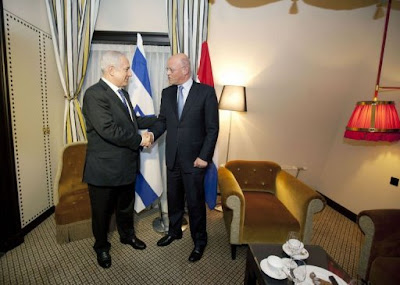The Dutch government has realized at least one point from the agreement on the basis of which it was installed in 2010 by Liberals and Christian Democrats with the passive support of Geert Wilders' Freedom Party (PVV), the point that stipulated that Holland would strive to 'strenghten the bond with Israel'.
The wish became reality with the visit on 18 ad 19 January, at the invitation of the Dutch government, of Israeli Prime Minister Netanyahu. It was the first visit by an Israeli PM in 15 years. Netanyahu met his colleague, Dutch Prime Minister Mark Rutte, and the ministers Uri Rosenthal (Foreign Affairs) and Maxime Verhagen (Trade). He was also received by Queen Beatrix.
As one of the most concrete results of the visit it was announced that Israel and the Netherlands will from now on hold yearly joint meetings of the Dutch and Israeli cabinets. The Netherlands joined the club in this respect: Israel already has similar agreements with Germany, Poland and Italy (countries that like Holland regularly vote against common EU-positions when they tend to be somewhat critical towards Israel, AbuP.)
With Trade minister Verhagen it was agreed that a trade mission will soon visit Israel to increase mutual trade. Holland and Israel are important trade partners. Holland exported goods worth about 1 billion euros to Israel last year (mainly trucks and electrical appliances) and imported for 2.1 billion (mainly medicine, computers and fruit). The Netherlands is Israel's second most important export destination in Europe.
In a speech for the Dutch Jewish community on Wednesday evening in the 17th century Portuguese Synagogue in Amsterdam, Netanyahu stressed that there is much in common between the Dutch and Israeli positions. In fact he made it clear that his visit was partly to thank the Netherlands for the positions it recently took in international fora. "The one issue in which we stand together is in opposing Iran's nuclear ambitions," he said to loud applause. He called Iran's nuclear programme "the greatest threat to Israel, the region and the world and thanked the Dutch government for its 'strong stance on sanctions against Iran'.
 |
| A small number of people protested in front of the synagogue. |
Other points that Netanyahu and Israeli officials mentioned, were the Dutch vote against the admittance of the Palestine to UNESCO, the rejection of the Goldstone report critical of the 'Cast Lead Operation' in Gaza in 2008-2009, Dutch opposition towards the Palestinian bid to be accepted as a member-state of the UN and the stance that Holland recently took against a common EU position in the UN-Human Rights Council.
So actueally it could be said that Netanyahu came to thank the Dutch for its anti-Palestinian stand. Geert Wilder's party, which had ties with the most radical parties in Israel like Lieberman's Israel Beiteinu and the National Union, can be quite satisfied. The same goes for minister Rosenthal who is by far the most Israel-friendly minister Holland has ever had. Rosenthal last year discarded a tradition of decades during which advocacy for human rights was one of the strongest pillars of Dutch foreign policy by saying that fo him it was not the number one issue, but that safety and stability in the world came first. (Interview in de Volkskrant, Dutch)


.jpg)



No comments:
Post a Comment